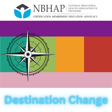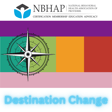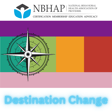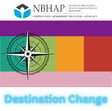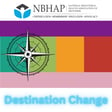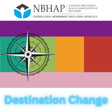Become a Creator today!Start creating today - Share your story with the world!
Start for free
00:00:00
00:00:01

Episode 16: Ryan Hampton
Ryan Hampton is a nationally recognized activist and organizer. He's a person in recovery from addiction and the author of Unsettled and American Fix.
A prominent speaker, author, media commentator and panel participant, Ryan travels coast-to-coast to add solutions to our current addiction epidemic. A former White House staffer, he has worked with multiple non-profits and national recovery advocacy campaigns. This includes Mobilize Recovery.
Transcript
Introduction to Angie and Ryan
00:00:12
Speaker
Welcome to Destination Change, a podcast where we talk recovery, treatment, and more. I'm your host, Angie Fiedler-Sutton, with the National Behavioral Health Association of Providers. Our guest today is Ryan Hampton. Ryan is a nationally recognized activist and organizer. He's a person in recovery from addiction and the author of Unsettled and American Fix. A prominent speaker, author, media commentator, and panel participant, Ryan travels coast to coast to add solutions to our current addiction epidemic. A former White House staffer, he has worked with multiple nonprofits and national recovery addiction campaigns. This includes mobilized
Ryan's Recovery Journey
00:00:44
Speaker
recovery. Welcome to Destination Change, Ryan.
00:00:47
Speaker
thanks for having me good to be here now for those who are familiar with the podcast they know what i'm gonna ask basically just kind of how you got into the industry space the addiction space itself it says you're a person to recovery but kind of that journey of what made you decide you wanted to help others yeah it's a great question thank you for asking me the question in the context of the beginning of my recovery journey because typically sometimes I get asked how did your addiction start and that
00:01:18
Speaker
You know, I think that's a, that's a, that's a common question, but I like to talk about the journey more than I like to talk about, you know, the cause. Honestly, I didn't ever envision myself getting into recovery advocacy or even quite frankly, being open and honest and talking about my story. And I had no desire to do that. My recovery dates, February 2nd, 2015. And
A Tragic Night and Systemic Failures
00:01:43
Speaker
shortly after I got into recovery, I was actually living in a sober living home. really having no idea what I was going to do with my life, you know, rebuilding kind of block from block at, at very, it felt like at the, you know, ground zero at the very beginning. And I had a catastrophic nightmare of a time trying to navigate the the healthcare space prior to getting into recovery through treatment and all sorts of issues. And when I ended up getting out of treatment into sober living, I was looking for a job and I ended up driving Uber.
00:02:16
Speaker
and was just in this mindset of you know hitting the reset button and and starting over and not really knowing where that was going to take me. About eight months into my recovery journey, I started experiencing something that's far too common, I think, in communities of recovery, and that is you know the loss of people who are close to us. One night I had been recruited and trained to become the new peer house leader of of the sober living I was living in. And one of my friends was the co-leader. And one night my roommate Nick had come home and he had had a recurrence of use and said, what do I do? I don't know what to do. There weren't many options on the table. It was like 9 PM at night and he was coming home from work. There were no,
00:03:08
Speaker
recovery meetings that were going on. There was a rule at the house that he was going to have to leave and it wasn't my rule, but it was the rule. And so a few of his peers, including myself, sat down on the deck outside the house and talked about it for a few minutes and tried to figure out, well, what do we do with Nick? And Nick didn't want to call home because his parents weren't talking to him. He couldn't go to treatment because he had no money. He had no insurance. He was terrified. He worked construction. He was terrified to call his work and let them know because he thought he would get fired. And the best idea that we could come up as a group was Nick should go to the hospital, which is, you know, was only about a mile away from our house and he could walk there. And so that's what we did. We sent Nick on his way to the hospital and he got to that hospital and he waited and he waited and he waited longer and
00:04:01
Speaker
He was there until about midnight is what the hospital documents say. He wasn't seen by a doctor. He wasn't triaged. He went in and he told them he needed help and he needed detox and that the sober living was going to let him back in as long as he detoxed there and got medically cleared, quote unquote, and the hospital didn't admit him. They sent him on his way with a white piece of paper with a bunch of crisis hotlines on it that he called the next
Founding a Nonprofit
00:04:28
Speaker
day. he died that night walking back to the house he used again and overdosed and died and i can remember crystal clear as day the next morning getting woke up by the owner of the house and circling us all up and telling us what happened. And then going on to tell us that this is just kind of something we have to deal with.
00:04:47
Speaker
that this is what happens people die he used kind of all the cliches in the book and i can remember it was that moment when i was so upset i wasn't just grieving i wasn't just in shock i was i was upset and angry and but there's something that's not right here you know yes people die but It's not like he just died. like He went to a healthcare facility, a hospital, not just any hospital, but like one of the best hospitals in the Southern California hospital system. They had something like a billion dollar endowment for disease states there. and and They turned him away and said they couldn't help him. It was at that moment, that day, that time you know that I decided something something was wrong and something needed to change. and so That summer, my best friend and I,
00:05:37
Speaker
Didn't know what to do and we run into 35-foot RV and we traveled the country and went to across 22 states and traveled something like 18,000 miles and we crowdfunded our way around the country just to meet other people who were impacted. We stayed in homes of friends and family members who had lost loved ones. We went into jails. We went out on the streets. We talked to people who were using drugs. We went into recovery community organizations. We talked to peers. And we got back from that trip and realized that we weren't alone, that we had felt that a lot of people around the country felt that they weren't being listened to. And that's what started us or led us to start the nonprofit. you know While we didn't really know what we were doing at the time, and we started it with $20, literally $20, we knew that folks' voices needed to be heard.
Growth and Advocacy Efforts
00:06:23
Speaker
We knew that you know an organized movement needed to come out of the recovery space. We knew that if more people who were directly impacted
00:06:32
Speaker
weren't just telling their stories, but were actually sharing their experiences and demanding some sort of change on the local level, whether it be through regulatory rulemaking or legislative or otherwise, that maybe we could turn the tide on this thing a little bit. To make a long story very short, like I think the journey from there has made up of a whole bunch of small parts. right People will say, well, how did you get to where you're at today? Honestly, it would take me 10 volumes of books to be able to tell that story because it it it they were all small things that happened along the way that led me down another path, that led our community down another path. and I think all of those small little turns and decisions you know kind of add up to who I am today. and To fast forward in 2024, that idea of that nonprofit has now grown into a multi-million dollar
00:07:26
Speaker
you know, advocacy organization with nearly 70,000 members and active coalitions and, you know, nearly 40 states and we've passed hundreds upon hundreds of pieces of legislation around treatment, recovery, harm reduction, evidence-based prevention. We've run programs to recruit recruit and train people for appointments to federal and state positions. We have folks who are training to run for office as people in recovery. We've gotten involved in Congress. We've gotten involved in state legislatures. We've passed sober home standards bills, which is something that we led from the beginning and taking the NAR standards and really codifying them into state and federal code.
00:08:07
Speaker
you know, these are all things that, you know, this is like the power of the recovery community and really at the heart of mobilized recovery, but it's oftentimes not me, right? It's not a me thing. You know, mobilized recovery was really an idea at the beginning. And it was an idea that what if, you know, we organized our community, but what if we built more leaders in the recovery community, right? In order to make seismic change, you need more leaders and you need those leaders to be trained up. on how to effectively lead their communities and we're not starting from scratch here right like movements like this have existed for a long time on so many issues whether it be. Healthcare care reproductive freedoms or social justice or hiv aids like you know communities of impacted individuals have stood up.
00:08:54
Speaker
to systems and demanded change that better serves their communities. And in our case, it happens to be with probably one of the most, if not the most catastrophic health crisis crisis of our time, which is overdose. And in order to stop overdose, we have to make sure we're supporting
Complex Solutions for Recovery
00:09:12
Speaker
recovery. And so we kind of look at it both ways. And even today, in 2024 as we head into an election, you know we're hearing about addiction. We're hearing about fentanyl a lot. But are we really hearing about what we need to do to end it that's realistic? This is where I think you know the nuances matter. And nuances are an important thing when addressing our issue. If you don't understand the nuances, you're not going to be able to understand the solutions that our communities need. It's not as simple as treatment. you know It's not as simple as some of the solutions that are being offered on television by politicians.
00:09:47
Speaker
It's a whole system of care that needs to be revolutionized.
Advice for Aspiring Advocates
00:09:51
Speaker
And I believe that until folks start to listen to the recovery community and folks start listening to folks who have been in those shoes and who have been through those systems and who have been who have fallen through those cracks and those that have succeeded, you know change will be very slow to come. So it's our hope through Mobilize and through our other efforts that we're inspiring new people to get involved, but also providing them the support to make you know the needed system changes in their communities. Well, that is a great segue into my next question in terms of getting people invested and all that. Our audience is kind of a wide range. We have everybody from regular counselors to CEOs, C-suite to everything in between. So if someone wanted to be become more active or be an advocate and whatnot, what is usually your piece of advice that you like to give people in terms of how to get involved?
00:10:42
Speaker
Yeah, I would say the most important thing is be authentic, right? I think there's some people that get into this space with a lot of ideas, but they lose their authenticity along the way. And if you're not authentic, it's very hard, I think, to actually relate to audiences of folks, you know, whether they be legislators or corporate CEOs or just, you know, your next door neighbors on what needs to happen. And I would say to get trained up, advocacy and Organizing is a craft you know it's just like anything else it's a craft there are helpful ways of doing it and there are harmful ways of doing it. I think we've seen a mix of both in the last couple of years in this space particularly.
00:11:25
Speaker
You know my best advice to folks would be to actually check out mobilize recovery I mean this is what we do, and they can go to mobilize recovery.org, they could also check out the recovery advocacy project our sister organization at recovery voices calm. we have a whole suite of tools for people to learn but you know my experience really there are prescribed steps like anything else right on how to to be an effective advocate really the first thing is is like really mastering the art of your public narrative.
00:11:58
Speaker
People in recovery are famous for being great storytellers, right? Like, we just, we are. We love sharing our story. We love, you know, talking about our experiences. But the way that we share our stories in our own recovery settings is sometimes isn't the same way, depending on the audience, that you should be presenting it to a group of folks kind of writ large in in an effort to impact change. um you know the the The craft of of effective storytelling you know through the context of public narrative is really how are you expressing your values and your agency, where your agency comes from, to a group of folks and then asking them to join you on some sort of walk towards some sort of needed change or sprint or whatever it may be.
00:12:51
Speaker
you know And I think our community is very in tune with the storytelling in the context of like what it was like, what happened, what it's like now. And sometimes that's not the best way. So you know if people were saying how to become an advocate, I'd say the first thing you really need to learn is how to effectively share your story. and That's not just for people in recovery, that's for providers, that's for C-suite folks. and These are the same type of tools that they teach you in corporate leadership. right like You don't just walk into a boardroom and share a whole bunch of folks that you need something from, just your genesis story and how you created your company. right No, you're going to ask them something to do. They're going to want to know where these values are coming from. They're going to want to know what you stand for.
00:13:37
Speaker
I think that that would probably be the most important thing for folks to do. and Then the second is, like how do you map power? right like you know We have a lot of allies in the recovery community. We also have systems that you know are fighting tooth and nail to make sure we don't you know disrupt the system too much. and That comes sometimes in the form of companies or agencies like ah insurance companies. right like Insurance companies love to see this space fragmented and disorganized because they end up being the winners of it. Large-scale pharmaceutical companies. i mean like There is a a definite power dynamic in being a good advocate and knowing who your allies are and knowing, I don't want to say necessarily your enemies, but who's in opposition to you.
00:14:21
Speaker
Building community is another really important strategy. You know you can't really have a go-it-alone strategy. I think a lot of folks have attempted at this by themselves, singularly trying to build a platform. If you're going to be an effective advocate, you've got to have a team that you're going to work with, a team that's also trained up and that you trust. ah you know There's wins and there are losses in being an advocate. and You need to figure out a way to celebrate both honestly. You need to be able to celebrate your wins, but equally, you need to celebrate you know your losses and the attempts you made because not everything you do is going to be accomplished or is going to be successful. so I think those are are are real key tenants. and you know At the heart of it, you know being authentic and always keeping your eye on your true north, which should be the community you serve,
00:15:11
Speaker
has got to be you know first and foremost. you know We've seen a lot of times folks jump into the space, get involved in a recovery advocacy, and then use that and build a company. or and and It's not that there's anything wrong with that, but there's advocacy and then there's corporate building. right They're two very separate things. And I know we've got providers and behavioral health folks on here. Thank you all for listening. I will say there's nothing more that drives me absolutely insane and folks who are advocates on the ground, you know, then seeing a treatment provider or behavioral health provider provide a business card, you know, for someone that works for them with the title of recovery advocate.
00:15:54
Speaker
you know i believe that maybe a recovery navigator or something like that but i believe that advocate title has somewhat been co opted. Buy the corporate space which really has made our job you know at the macro level a little bit harder because it gets confusing for folks i like to say when you're like a recovery advocate. you know you're advocating for the community at large. right like You're not advocating for one particular company or one particular business model, if that makes sense.
Ryan's Books and Purdue Pharma
00:16:26
Speaker
Well, you mentioned storytelling as one of your resources. You have a couple of books. We don't have a whole lot of time left, but kind of give me your elevator pitches to what the books are about for those who may not be familiar with them and kind of what prompted you to write something.
00:16:40
Speaker
The inspiration to write both books were driven through just personal experiences I was going through. American Fix was my first book it published in August of 2018. When I had gotten home from that cross country trip, and was just starting to get involved in the nonprofit space and the advocacy space. I remember I had gone to a bookstore in 2017 called Romans in Pasadena and was looking for a book about the addiction crisis, but not through the lens of like a journalist or a celebrity. I was really just kind of looking for a think tank book on like, you know, what the solutions could be, what we could be doing.
00:17:20
Speaker
and I spent like three hours or so in that bookstore just looking, you know perusing all the behavioral health material and addiction you know material and had a really hard time finding that book. I found some great books by some people I really admire, but nothing that was really ringing true to what I was looking for. and I got home that night and i asked my I told my roommate the story and didn't really find the book I was looking for. He was like, well, you you should think about like writing something like nothing like outrageous but like why don't you write something about the folks we met in the stories we heard and you know the things that you saw and that we saw and what different communities are doing around the country and i was like you know it's not really a bad idea but i've never written a book i don't know how to write a book and so you know being that i'm in recovery and
00:18:05
Speaker
you know, when I don't know something, I asked someone and the but the the the person that, you know, not person, but the machine that was near me was Google. And I remember Googling like, how do you, how do you write a book? And Google gave me a, found I found my way to a blog that, you know, told me, gave me all the instructions of needing an agent, writing a book proposal and how to write a book proposal and what the template looked like. And I went through all those steps and I ended up submitting the book to the five big publishers. and just sending it off, the the proposal off of this book that I wanted to write. like Much to my surprise, three of them got back to me and I ended up settling on Macmillan and St. Martin's Press and published American Fix. and american fix is really I like to think of it as like a beginner's guide to advocacy and what we could be doing to get us out of this crisis that we're in, you know if we only got out of our own way. It ended up being a bestseller.
00:18:57
Speaker
shortly after it came out and it really opened the doors for me to meet a lot of phenomenal people around the country who are doing even more than what I wrote in the book. I'm grateful I had that opportunity. The second book, Unsettled, actually came out as ah an experience my experience as the victim's representative on the Purdue Pharma bankruptcy creditors committee. I was appointed by the Department of Justice in 2019 to represent 120,000 victims in the Purdue Pharma bankruptcy. I was under all sorts of protective orders and and not allowed to talk about my experiences and conversations with the Sackler family and different attorneys general. and it It was also in the height of COVID, so I was in lockdown.
00:19:42
Speaker
I had kept a journal of my experience because i was so frustrated because what people were being told on the outside about what was happening was not really what was going on in the inside and i saw it as a grave injustice to our community and two family members and two. Folks who are impacted by produce greed. And so I kept this journal and shortly after the first round of the bankruptcy was gaveled and the bankruptcy plan had been confirmed, I resigned from the committee and then ended up deciding that I was actually going to publish my notes in my journal in the form of a book and rewrote my journal in the form of a book because it was my opinion and donated all proceeds to nonprofits from it.
Goals for 2024 and Political Involvement
00:20:26
Speaker
it was my opinion that if the injustice of the pretty pharma bankruptcy process was really not put out into the public and in the sunshine that the same thing would happen again and we have seen this go all the way up to the supreme court where it's sitting right now for a decision because a lot of us decided to get vocal about the injustices that we experienced. And then there is a third book coming in September of 2024. My third book will be published titled Fentanyl Nation. And it's really a manifesto or an examination of how toxic politics is really taking us backwards when it comes to ending drug overdose deaths.
00:21:02
Speaker
that much unlike when i wrote american fix this is no longer very as much of a bipartisan issue as it used to be we're seeing members of of both parties major parties politicize the issue for political gain and it's doing you know folks on the ground no no service at all. Awesome well we're getting close to the wrapping up it's 2024 it is an election year you already mentioned at once kind of your goals for the year both ah just as yourself as well as mobilize recovery and what you hope to accomplish.
00:21:33
Speaker
Yeah, I mean, it's my hope that we're going to be doing a lot this year and more will be revealed. But I would say that it's my hope that more people in recovery and folks who are impacted get involved in this election. You know, politicians and elected officials, both in Congress and in our states, Listen when we vote. I don't care if it's Republican, Democrat, blue, green, yellow, whatever color you might be, partisan-wise, if you're not voting and you're not talking to your elected representatives about this issue and what's happening in your community, we end up getting a pat on the head and politicized for television commercials and political gain.
00:22:12
Speaker
So it's really my hope that this community steps it up a little bit, this election cycle and gets more involved. It's not about who you vote for, it's about making sure who you support knows what needs to be done.
Conclusion and Resources
00:22:26
Speaker
you know and We hope to be a part of the solution on that. Awesome. Now, was there something that you were wanting to talk about that we haven't or something that you thought I was going to ask but didn't? No, they were good. Great. Awesome. You already mentioned it a little bit, but briefly, if people want to get more information about you or about Mobilize Recovery, where can they go to find it? Sure. Folks can go to www.mobilizerecovery dot.org. They can learn more about me and my books at ryanhampton dot.com and also the Recovery Advocacy Project, our sister organization at recoveryvoices.com.
00:22:58
Speaker
Well, I could sit and probably talk to you for another couple hours, but unfortunately we're out of time. So you've been listening to Destination Change. Our guest today was Ryan Hampton. Thanks for being out here. Our theme song was Sun Nation by Kizza and used via Creative Commons license by the Free Music Archive. Please consider rating and reviewing the podcast on Apple Podcasts so we can get more listeners. In the meantime, you can always see more about the podcast, including show notes and where else to listen on our website, www.NBHAP.org. If you have any questions for the podcast, please email us at info at nbhap.org. Thanks for listening.
